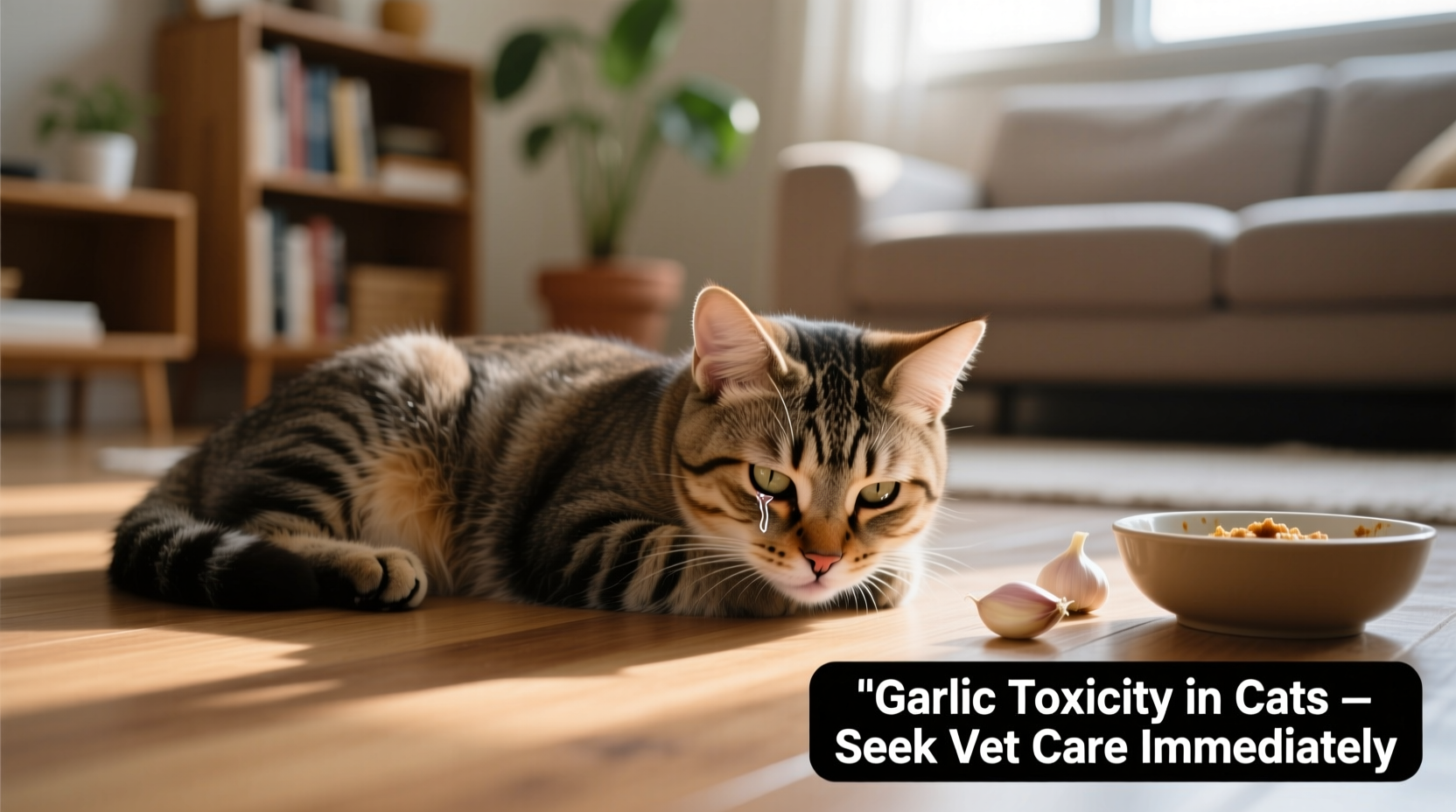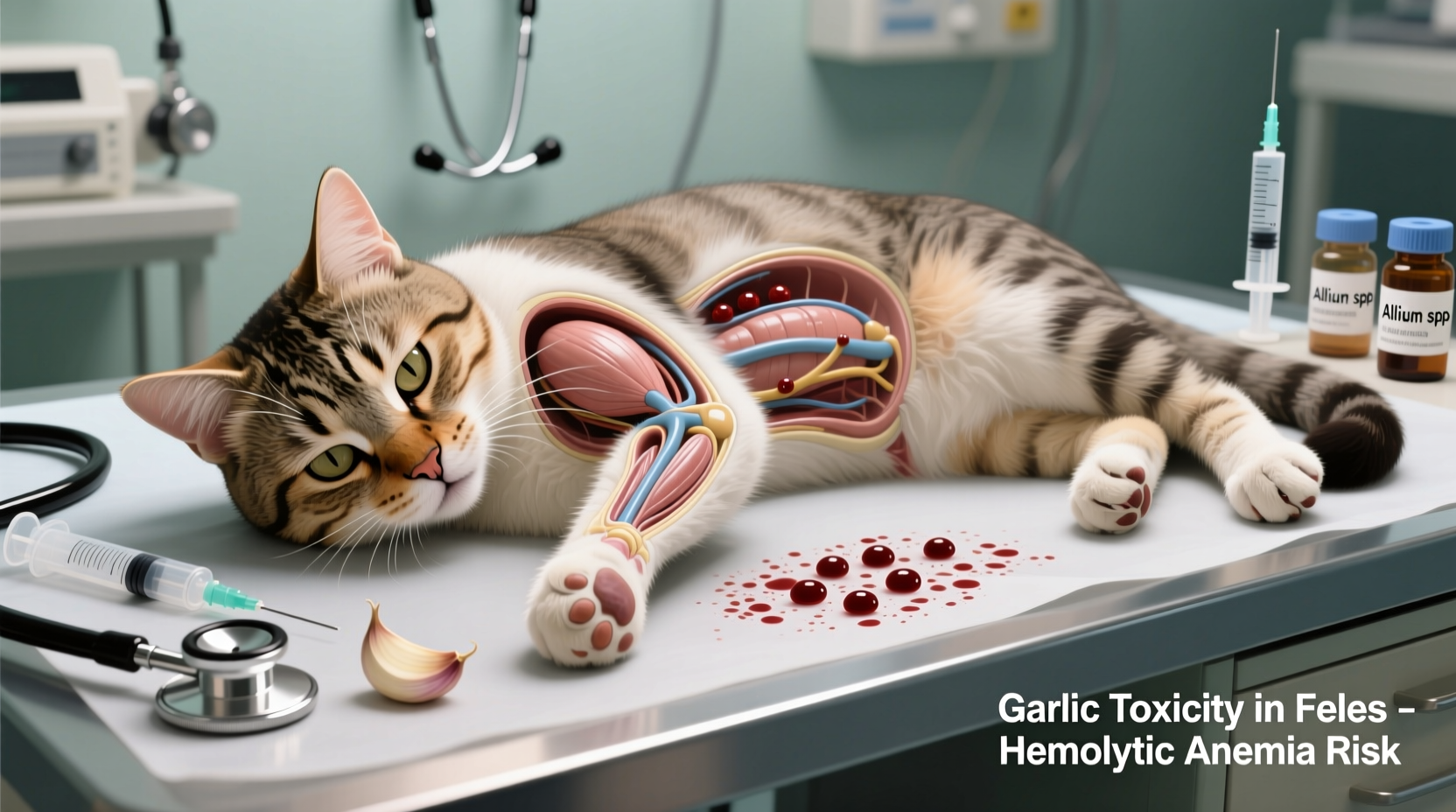Why Garlic Poses a Critical Threat to Cats
Garlic belongs to the Allium family, which includes onions, leeks, and chives—all dangerous to felines. Unlike humans, cats lack the enzyme glucuronyl transferase needed to safely metabolize N-propyl disulfide compounds in these plants. When ingested, these compounds oxidize hemoglobin, forming Heinz bodies that rupture red blood cells.
According to the ASPCA Animal Poison Control Center, garlic is five times more toxic to cats than onions. A single clove (3-7 grams) can poison a 10-pound cat, while garlic powder concentrates the toxin—just 1/4 teaspoon equals one whole bulb.
| Allium Type | Toxic Dose for 10lb Cat | Onset of Symptoms |
|---|---|---|
| Raw Garlic | 1 clove (3-7g) | 24-48 hours |
| Garlic Powder | 1/4 tsp | 12-24 hours |
| Cooked Garlic | 1/2 clove | 48-72 hours |
Symptom Timeline: What to Watch For
Garlic poisoning symptoms often appear deceptively late. The Pet Poison Helpline documents this progression:
- 0-24 hours: Vomiting, diarrhea, abdominal pain (often mistaken for general stomach upset)
- 24-72 hours: Pale gums, rapid breathing, weakness as anemia develops
- 3-5 days: Dark urine (hemoglobinuria), jaundice, collapse from severe anemia
- 7+ days: Potential kidney failure if untreated

Immediate Action Plan: Your Cat Ate Garlic
If your cat ingested garlic within the last 2 hours:
- Call your vet or animal poison control immediately (ASPCA APCC: 888-426-4435)
- Do NOT induce vomiting unless instructed—garlic irritates the esophagus
- Collect evidence: Note the garlic form (powder, cooked, raw), amount, and time consumed
- Transport safely: Bring remaining garlic product to the vet for analysis
Veterinarians typically administer activated charcoal to absorb toxins and provide IV fluids. Severe cases may require blood transfusions—the American College of Veterinary Surgeons reports mortality rates reach 30% without transfusion when packed cell volume drops below 15%.
Prevention Strategies Every Cat Owner Must Know
Many owners unknowingly expose cats to garlic through:
- Human foods (garlic bread, pizza, sauces)
- "Natural" flea repellents containing garlic
- Leftover meals on countertops
- Garden access to garlic plants
Replace dangerous "cat health" myths with science-backed alternatives. The American Veterinary Medical Association confirms no safe garlic dosage exists for cats—unlike dogs who may tolerate trace amounts, felines have zero metabolic capacity for Allium compounds.
When Home Monitoring Fails: Critical Warning Signs
While mild exposure might only cause temporary digestive upset, seek emergency care immediately if you observe:
- Gums losing pink color (pale or yellowish)
- Increased respiratory rate (>30 breaths/minute)
- Refusal to eat for 12+ hours
- Urine darker than apple juice
These indicate advancing hemolytic anemia requiring hospitalization. Delaying treatment risks irreversible organ damage—the Cornell Feline Health Center notes cats with garlic poisoning often need 5-7 days of intensive care to regenerate red blood cells.
How soon after eating garlic will my cat show symptoms?
Symptoms typically appear 24-72 hours after ingestion as red blood cell damage accumulates. Early signs include vomiting and lethargy, while severe anemia symptoms (pale gums, rapid breathing) develop within 3-5 days.
Is cooked garlic safer for cats than raw garlic?
No. Cooking doesn't reduce garlic's toxicity—it concentrates the harmful compounds. Just 1/2 clove of cooked garlic can poison a 10-pound cat. All forms (powdered, cooked, raw, liquid extracts) are dangerous.
Can cats recover from garlic poisoning?
Yes, with prompt veterinary treatment. Mild cases may resolve in 3-5 days with supportive care. Severe cases requiring blood transfusions typically need 7-10 days of hospitalization. Full recovery depends on early intervention before organ damage occurs.
Why is garlic toxic to cats but not dogs?
Cats lack the metabolic pathway dogs possess to partially process Allium compounds. While dogs can develop toxicity from large amounts, cats are affected by much smaller doses due to their unique physiology. Garlic is five times more toxic to cats than dogs.
Are garlic supplements ever safe for cats?
No. Despite misleading marketing claims, veterinary associations universally warn against garlic supplements for cats. The American Veterinary Medical Association states there is no safe dosage, and even micro-doses in "natural" products can cause cumulative toxicity.











 浙公网安备
33010002000092号
浙公网安备
33010002000092号 浙B2-20120091-4
浙B2-20120091-4